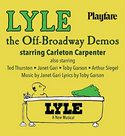|
 LYLE LYLE
THE OFF-BROADWAY DEMOS
Original Cast Records
CD
A peppy and plucky long-lost Off-Broadway musical score by Janet Gari and Toby Garson has bubbled up from the past with its resurrected, remastered demo. The show it pitched was presented in New York City, but quickly disappeared. It's about a crocodile named Lyle and it's about time. Has any protagonist reptile ever inspired so many musical scores? Bernard Waber's books for kids about a vaudeville-experienced creature who makes himself at home in a family's Manhattan apartment have been multi-musicalized. In addition to the film that came out a few months ago with songs by Pasek & Paul, among others, and a 1987 animated special for HBO with music and lyrics by Charles Strouse that was expanded as a stage vehicle, other songwriters have taken a crack at the croc for shows produced by children's theatre companies. But before all that, there was the Off-Broadway Lyle project, produced in 1970, but not getting its own actual cast album. However, better late than never, we can taste the treats of the deft material with the delightful demos made in 1969.
Happily, the tone and sensibility reside in that happy medium ground between old-school musical comedy froth and a style that is sufficiently simple and simpatico with an attentive children's audience, appropriate for a show based on books for youngsters. But this is not some kind of kindergarten capering.
Celebrating our hero's every attribute ("cute...Love your green suit!") is the group number lauding "Lyle" in the style of Mame's title song, exulting "Lyle!/ Gee, but you're wonderful/ Where would we be/ If we couldn't see/ Your smile?/ You have a talent for making each moment worthwhile." There are lilting, wistful ballads that still manage a spring in their step, like "Things Were Better in the Past," which sneaks in a rhymed aside within that message ("Things were much better in–Take it from a veteran") and has a nifty counterpoint section. Perky paeans to the joys in life include doting on: a prized cat's company ("Loretta"); serenely sloshing in a bathtub's tap water because, as per Lyle, "The Sea's Too Salty"; and the valuable performers' lesson about audiences, to "Always Leave 'Em Wanting More." This razzamatazzy strut takes its own advice, dashing in for chuckles and gone in 42 seconds, making the similar-length (or rather, similar-lack-of-length) reprise anticipated and welcome. Many tracks are short and sweet, at somewhere under or over a minute in length. But even some of the briefest bouncy bon-bons feel sufficiently full and full of fun, such as the zippy number marches to the virtues of being an "Animal in America," encouraging pride ("Quadrupeds: Lift your heads!").
Along with its songwriters Gari and Garson, plus endearing singer-pianist Arthur Siegel, two Broadway veterans are heard, to entertaining advantage, on the belated issue of this set. They were set to star in the musical, but did not stick with Lyle. They are Carleton Carpenter (who departed during troubled previews), as the titular animal, and Ted Thurston, winning roles including Lyle's flamboyant, self-impressed former show-biz partner and the curmudgeonly neighbor. Both sound terrific and full of vibrant character. Most of the songs are heard in at least two versions, with studio recordings that mainly feature Carpenter and Thurston, followed by engaging, enthused vocals in home demos done by the gentler Siegel, composer Janet Gari and lyricist partner Toby Garson. The ladies were longtime friends whose fathers knew well the spotlight of show business: respectively, entertainer Eddie Cantor and songwriter Harry Ruby. Apples don't fall very far from their talented trees, proven further by the last track with the melodist's son, a then 18-year-old Brian Gari on piano and vocal, anticipating his career as a songwriter and performer. His Lyle entry is the affecting "Suddenly You're a Stranger."
Let's drain the swamp and bring back this strong, early incarnation of the beloved crocodile to make a splash.
 ELLA FITZGERALD ELLA FITZGERALD
LIVE AT MONTREUX 1969
Mercury Studios
CD, Digital, Vinyl
(previously available on DVD)
1969 was the year of the manned moon landing, Woodstock, the debut of "Sesame Street," when Americans could buy a gallon of gas for 35 cents and a head of lettuce sold for a dime, and the country's best-selling non-fiction book was the dictionary. That last item has yielded limited success for music critics seeking new words to praise the long-careered "First Lady of Song," Ella Fitzgerald, although she had the kind of tone and "chops" that made some employ the saying that even hearing her sing the dictionary (or phone book) would be satisfying. By 1969, at age 52, she was more than well established with decades of performing and dozens of albums, already honored with eight Grammy Awards–including one from the first year they were given (1958) for her double-LP of The Duke Ellington Songbook. One of its selections, "Love You Madly," is dispatched with aplomb on Live at Montreux 1969. And there's no doubt that the enthusiastic crowd at this first of her several appearances at Switzerland's annual jazz festival seemed to love her madly.
Everything gets the "Ella touch" of personalization, in what might seem an odd or daring mix of old standards like "I Won't Dance" and then-recent pop items ("Hey Jude" gets some welcome variety with jazzy embellishments decorating the melody line). The pièce de résistance jaw-dropper is a montage of scat-singing showmanship, wherein the remarkable vocalist fleetly and fabulously improvises on the melodies of "One-Note Samba," along with bits of "Anything Goes," "They All Laughed," "A-Tisket, A-Tasket," mostly sans words, imitating instrumental sounds (keeping up with her band or totally a capella).
This is just one of the parade of live concerts to be released for the first time in audio form in the years following her death in 1996. But the documentation of this dynamic performance is not unknown to those of us who noted and snapped up its release as a DVD, on the market since 2005. Why was it so long belated/not prioritized for being issued in either format? Well, it wouldn't have been a logical choice to put on the market back in 1969 when The Sunshine of Your Love, a live album from a San Francisco engagement featuring the same trio and nine of the same songs, was already out. However, Montreux has five very worthy other things, and, as improvising is the M.O. for jazz, Fitzgerald fans know that repeat treatments always meant new treats to surprise. The most prominent examples are where other songs are uniquely interpolated within recent pop fare. The hard-driving Cream rock hit "The Sunshine of Your Love" veers off into a bluesy tangent, morphing into "Work Song" (Oscar Brown, Jr./Nat Adderley) by the end. The Burt Bacharach/Hal David ballad "This Girl's in Love with You" has a section of "I'm Gonna Sit Right Down and Write Myself a Letter" woven into it.
Unlike many jazz dates, the musicians do not get much focus with extended solos, although they are a top-drawer trio. They are bassist Frank De La Rosa, drummer Ed Thigpen, and longtime pianist Tommy Flanagan. Tempi tend to be either very hot and fast or strikingly tender and luxurious. The playing and singing are often gutsy, not shying away from assertive attacks, dialing up the gritty intensity and/or astonishing speed. At one point in the patter, the singer announces a slow-paced piece, cutely assuring the audience that she and the guys will soon wake them up. Mid-song, she characteristically asks Flanagan to "Play pretty for the people," and she does pretty well with the pretty passages herself, most sublimely in the purity of her sound on another Bacharach/David choice, "A House Is Not a Home."
Note on vinyl: The vinyl version does not include two of the tracks present in the other formats (the moving and melancholy "Useless Landscape" and the 1966 movie title tune "A Man and a Woman"). Note on liner notes: Mostly recycled from the comments prepared for the DVD, they don't list most of the songwriters and mix up what song included in the set Peggy Lee had previously been identified with. It's "Alright, Okay, You Win." But it's alright, OK; you win for sure if you get to know this Ella Fitzgerald fashionable performance, fashionably late by about 53 years.
|
|